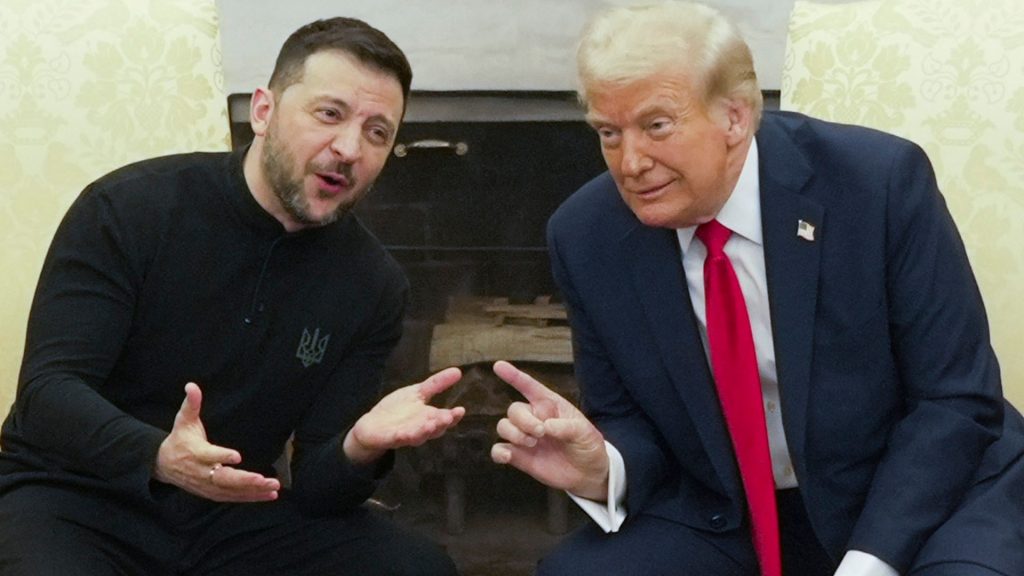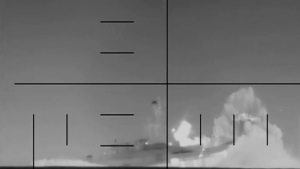US-Ukraine minerals deal is clear signal to Russia: Treasury secretary

A deal between the U.S. and Ukraine allows the Trump administration access to rare earth minerals. Also, while the GDP declined in the first quarter, imports continue to surge. These stories and more highlight your Unbiased Updates for Thursday, May 1, 2025.
US, Ukraine sign long-awaited minerals deal
The U.S. and Ukraine signed a long-awaited minerals deal on Wednesday, April 30. The agreement, originally set for February, was delayed following a tense Oval Office meeting between President Donald Trump and Ukrainian President Volodymyr Zelenskyy in front of the press corps.
The minerals deal, a long-term economic partnership, grants the U.S. access to Ukraine’s rare earth minerals, including aluminum, graphite, lithium, uranium, oil and natural gas. For Ukraine, this likely means that the U.S. will continue to supply military aid.
Treasury Secretary Scott Bessent said the deal creates the U.S.-Ukraine Reconstruction Investment Fund, which will “help accelerate Ukraine’s economic recovery.” In a video post on X, Bessent also said it’s crucial for Ukraine’s national security.
“Today’s agreement signals clearly to Russian leadership that the Trump administration is committed to a peace process centered on a free, sovereign and prosperous Ukraine over the long term. It’s time for this cruel and senseless war to end,” Bessent said.
The Trump administration has continued efforts to broker peace between Ukraine and Russian President Vladimir Putin to end the war that is now in its fourth year. Russia has proposed a three-day ceasefire beginning next Thursday, May 8. However, Zelenskyy has not yet accepted the offer and has voiced skepticism that Russia will honor its own proposal, saying it is designed to deceive the U.S.
The U.S. State Department again this week urged for negotiations to progress more quickly.
Rubio attempts to defuse tensions between India and Pakistan over Kashmir attack
The U.S. has become involved as tensions escalate between India and Pakistan following last week’s fatal assault in a contested region of Kashmir. Secretary of State Marco Rubio urged Pakistan’s prime minister and India’s foreign minister to de-escalate the situation during a call on Wednesday, April 30, according to the State Department.
India vowed to punish Pakistan, accusing it of backing the attack, which left 26 tourists dead. Islamabad denies those allegations.
Since the attack, the nuclear-armed rivals have expelled each other’s diplomats and citizens, ordered the border shut down and closed their airspace to each other. In addition, New Delhi has suspended a crucial water-sharing treaty with Islamabad.
Soldiers on each side have also exchanged gunfire, escalating tensions even further. Kashmir is divided between India and Pakistan, yet both countries claim full ownership of the region.
Vance’s tie-breaking vote kills bipartisan Senate measure to block tariffs
In Washington, Senate Republicans narrowly voted down a Democratic resolution to block President Donald Trump’s global tariffs. Senate President JD Vance, the vice president, cast the deciding vote in the 49 to 49 tie by voting “no.” Three Republicans broke from the GOP to oppose the measure: Sens. Lisa Murkowski, Rand Paul and Susan Collins.
The resolution would end the national emergency declared on April 2 that Trump has used to impose the tariffs, effectively blocking them. Even if it had passed in the Senate, the vote was largely symbolic, as the bill likely would not have passed the House. Plus, Trump would surely veto it if it reached his desk.
One other note on tariffs: Trump said on Wednesday, April 30, that Canadian Prime Minister Mark Carney has attempted to make a trade deal and will visit the White House next week.
Columbia University student activist detained by ICE freed by judge’s order
The Columbia University student arrested two weeks ago by U.S. Immigration and Customs Enforcement agents following his citizenship interview — Mohsen Mahdawi — is free from federal custody, at least for now. Mahdawi’s legal team had petitioned for his release, arguing that he was unlawfully incarcerated.
The U.S. government accused Mahdawi, a permanent U.S. resident, of undermining foreign policy.
A federal judge in Vermont ordered the government to release Mahdawi while his case proceeds, stating he poses no flight risk.
The judge instructed Mahdawi to remain in the state where he resides and attends school online, allowing him only to travel to New York City to consult with his lawyers and visit the university.
US economy shrank in first 3 months of 2025 as imports surged ahead of tariffs
A rise in imports and a drop in spending by American consumers and the federal government led to a significant report on the U.S. economy released on Wednesday, April 30. The Commerce Department reported that gross domestic product decreased by 0.3% in the first quarter, whereas analysts had forecasted a growth of 0.4%.
GDP represents the total value of goods and services produced from January to March. This marks the first quarter of negative growth since early 2022.
Imports increased by over 40%, which is significant because imports are subtracted from GDP. Meanwhile, exports rose only by 1.8%.
One top economist told CNBC that some negativity is due to a rush to bring in imports before the Trump-imposed tariffs go up. Consumer spending increased by less than 2%, down from 4% in the previous quarter.
Even with all this, the Dow increased by 141 points, the S&P 500 climbed 8 points and futures are up again Thursday morning, May 1.
Trump responded to the economic news on his Truth Social, stating, “Our Country will boom, but we have to get rid of the Biden ‘Overhang.’ This will take a while, has NOTHING TO DO WITH TARIFFS … BE PATIENT!!!”
Two consecutive quarters of negative growth would indicate that the U.S. is in a recession, so this upcoming quarter will be crucial.
Satellite mission to ‘weigh’ Earth’s 1.5 trillion trees underway
A new satellite designed to study the Earth’s forests and “provide unprecedented insight” into how they impact the planet’s carbon cycle is now in orbit. The European Space Agency’s first-of-its-kind Biomass satellite will “weigh” the planet’s trees and determine their carbon dioxide capacity.
The ESA said Earth’s forests collectively absorb and store approximately 8 billion tons of carbon dioxide, which helps regulate the planet’s temperature each year. Deforestation and degradation result in the release of stored carbon into the atmosphere, which many scientists believe contributes to climate change.
The ESA currently highlights the lack of precise data regarding the carbon storage capabilities of the planet’s estimated 1.5 trillion trees and the impact of human activities on this. However, they are working to address this issue.
So, how will it work?
Biomass is equipped with radar technology that penetrates forest canopies to assess woody biomass. This woody biomass includes the trunks, branches and stems of trees, which hold the majority of carbon in forests. The ESA said these measurements will act as a proxy for carbon storage.
According to the BBC, the satellite is currently over the Amazon, one of several rainforests it will study.





